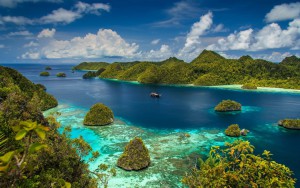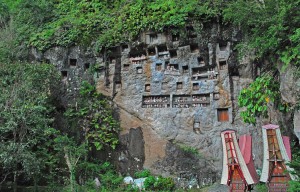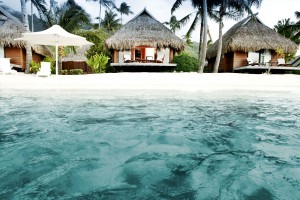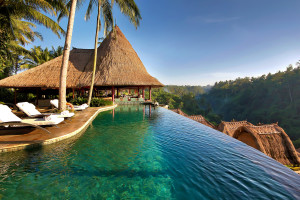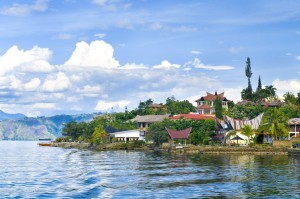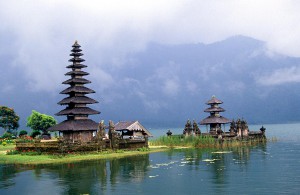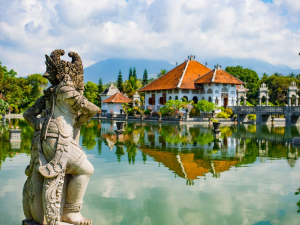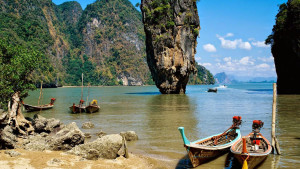Visa Information
South African passport holders do require a visa for Indonesia. For details please contact our office.
Main Airport
Soekarno–Hatta International Airport in Jakarta
Ngurah Rai International Airport in Denpasar
Juanda International Airport in Surabaya
Electricity
230 volts AC, 50Hz but 127 volts is still used in some areas. Plugs used are European-style with two circular metal pins.
Climate
We recommend that you check the weather forecast prior to your departure so that you can pack accordingly.
The whole archipelago is tropical, with temperatures at sea level always between 21˚C and 33˚C, although cooler in the mountains. In theory, the year divides into a wet and dry season, though it’s often hard to tell the difference. Very roughly, in much of the country, November to April are the wet months (Jan and Feb the wettest) and May through to October are dry. However, in northern Sumatra, this pattern is effectively reversed. The peak tourist season, but not necessarily the best time to visit, is between mid-June and mid-September and again over the Christmas and New Year season. This is particularly relevant in the major resorts, where prices rocket and rooms can be fully booked for days, and sometimes weeks, on end.
Best Time to Travel
Java
The temperature in Java doesn’t much vary, ranging from a minimum of 23° C to a maximum 31° C. The rainy season is from April to October and the dry season is from May to September. Dry season is also the best time to visit Java because weather is clear, roads in the interiors are open, and temperatures are at their best.
Sumatera
The best time to visit Sumatra is in September and October. It is the beginning of the rainy season and generally there are no torrential rains during this period. One can travel to inner countryside without much of a problem during this time.
Borneo
The best time to visit this fascinating island is during the months of September and March, when temperatures are much cooler-in the vicinity of 27°C with pleasant sea breezes.
Bali & Lombok
The ideal season to visit Bali and Lombok is between March and September. This period is best for beach lovers as the day temperature remains good. It may rain sometimes during the day but it will fresh the air and bring more joy and fun for the traveler.
For Lombok, the western islands are more fertile than the eastern and have a humid climate which is rich on rain. It has tropical climate with average temperature ranging between 28°C and 34°C. There are two main seasons: wet (from October to April) and dry (from May to September). Humidity is high throughout the year.
Komodo, Flores & Sumba
The eastern islands are dry and not very fertile, mostly caused by the hot and dry winds coming up from the Australian continent. Many coastal areas here do not have any rain at all during large parts of the year. The Pasola takes place in February in Lamboya and Kodi and March in Wanukaka, but for cruise and under water; April to August is the best time to visit.
Sulawesi
The best time to visit Sulawesi is during dry season from April to October. June to October offers the best chance of witnessing a major Torajanese funeral.
Papua
The climate is tropical, warm and humid along the coast and in the lowlands, cooler in the highlands. In the monsoon season the rainfall can be very heavy, up to 5.500 mm a year. Some of the largest rivers in Indonesia are flowing here, Baliem, Memberamo and Tariku. In the south west regions the rivers have created large areas of mangrove swamps and tidal forests. The best time to travel in Papua is between May and October when the climate is relatively dry.
Example packing list:
- Main luggage & luggage padlocks
- ‘Day bag’ – a smaller bag to carry with you during the day
- Money belt to carry passport, cash, credit cards, airline tickets, etc
- Trousers (or long skirts for women)
- Shirts or long-sleeved tops of light cotton material
- Walking shoes and socks – it is important to have sturdy and comfortable shoes for sightseeing every day.
- Sun protection – hat, sunscreen and lip balm
- Personal medical kit including insect repellent
- Antibacterial wipes – wipes such as ‘Wet Ones Anti-bacterial’ to clean hands before eating
- Tracksuit/similar outfit of soft material is recommended for the overnight train journeys
- A water/windproof jacket
- Light jumpers/thermals are great for layering, including gloves and scarf
- A ‘modesty shawl’ or sarong to wear in Muslim or conservative areas (for women)
- Torch, conversion plug and spare batteries – batteries available to buy in India tend to be unreliable
- Scarf or bandana – useful to protect your face against dusty winds at high altitude
- Spare glasses – it is difficult to get any prescription lenses repaired or replaced in Indonesia
- Small bath towel is useful for overnight train journey
- Toilet paper – not all public toilets will provide this
- Snacks – tea bags/coffee, milk powder or sachets, instant soups or noodles, or anything else you can’t live without!
- Camera and spare film/memory card – film available in India tends to be bad quality or sun damaged.
Money
The unit of currency in Indonesia is the rupiah (Rp). When taking US$ in cash, make sure the bills are new and crisp, as banks in Indonesia can be fussy about which bills they accept (Flores and Sumatra are particularly bad). Larger denomination US$ bills also tend to command a premium exchange rate. In more out of the way places it is worth making sure that you have a stock of smaller notes and coins – it can be hard to break larger bills.
Two of the better banks are Bank Negara Indonesia (BNI) and Bank Central Asia(BCA). BNI is reliable and efficient and most of their branches will change US$ TCs. Banks in larger towns and tourist centres have ATMs. Cash or traveller’s cheques (TCs) can be changed in most tourist centres at a competitive rate. Credit cards are widely accepted.
Tipping is commonplace. A 10% service charge is added to bills at more expensive hotels. Porters expect to be tipped for each bag. In more expensive restaurants, where no service is charged, a tip of 5-10% may be appropriate. Taxi drivers (in larger towns) appreciate a small tip. Parkirs always expect payment for ‘watching’ your vehicle.
Customs & Duty Free
The duty-free allowance is 2 litres of alcohol, 200 cigarettes or 50 cigars or 100 g of tobacco, along with a reasonable amount of perfume. Prohibited items include narcotics, arms and ammunition, TV sets, radio/ cassette recorders, pornographic objects or printed matter.
Keeping In Touch
Phone Calls
Operator T101. International enquiries T102. Local enquiries T108. Long distance enquiries T106. Every town has its communication centres (Wartel), where you can make local and international calls and faxes.
Mobile Phones
Known as hand-phones in Indonesia, use has sky rocketed and costs are unbelievably low. Top-up cards are sold at various denominations. Beware of vendors in Kuta, Bali who try and sell Sim cards at highly inflated prices. Popular companies include Telkomsel, IM3 (the cheapest for international calls – ask vendor about necessary prefixes) and Pro XL.
Internet & Email
Any town of any size will have an internet café.
Time Difference
Indonesia is 5 hours ahead of South Africa.
Travel Health
Health insurance to include emergency repatriation cover is strongly advised. Adequate routine medical care is available in all major cities, but emergency services are generally inadequate outside major cities. The best public hospitals are found in Jakarta, where the ratio of medical staff to general population is much higher and clinics catering specifically to foreigners can be found. Doctors and hospitals often expect immediate cash payments before any treatment is given, so it is advised that you have travel insurance before travelling to Indonesia. The number for medical emergencies is 119; for ambulance services call 118. Although medical costs are relatively cheap, drugs can be expensive.
Food and drink
Water used for drinking, brushing teeth or making ice should have first been boiled or otherwise sterilised. Drinking bottled water is advised. Milk is unpasteurised and should be boiled. Powdered or tinned milk is available and is advised. Avoid dairy products that are likely to have been made from unboiled milk. Only eat well-cooked meat and fish. Vegetables should be cooked and fruit peeled.
Other risks
Vaccinations for tuberculosis, meningitis and Japanese B encephalitis are sometimes recommended. There is a real risk of heatstroke; visitors to Indonesia should avoid the midday sun, remember to drink lots of water and apply sun cream. Travellers should also take care to acclimatise slowly when travelling to high-altitude areas, to avoid altitude sickness.
Personal Medical Kit
Take all pharmaceutical products that you may require on your tour; do not rely on being able to purchase these during your holiday. Consider taking a ‘personal medical kit’ containing any medication or medical equipment you may need during your time in Indonesia:
- All prescribed medication (with a cover note from your doctor)/ copy of repeat prescription
- Headache tablets
- Anti-diarrhoea tablets
- Cold and flu tablets
- Travel sickness tablets
- Lozenges
- Insect repellent and bite/sting relief
- Sunscreen
- Antibacterial hand wipes and/or hand wash
- Spare pair of glasses/contact lenses

